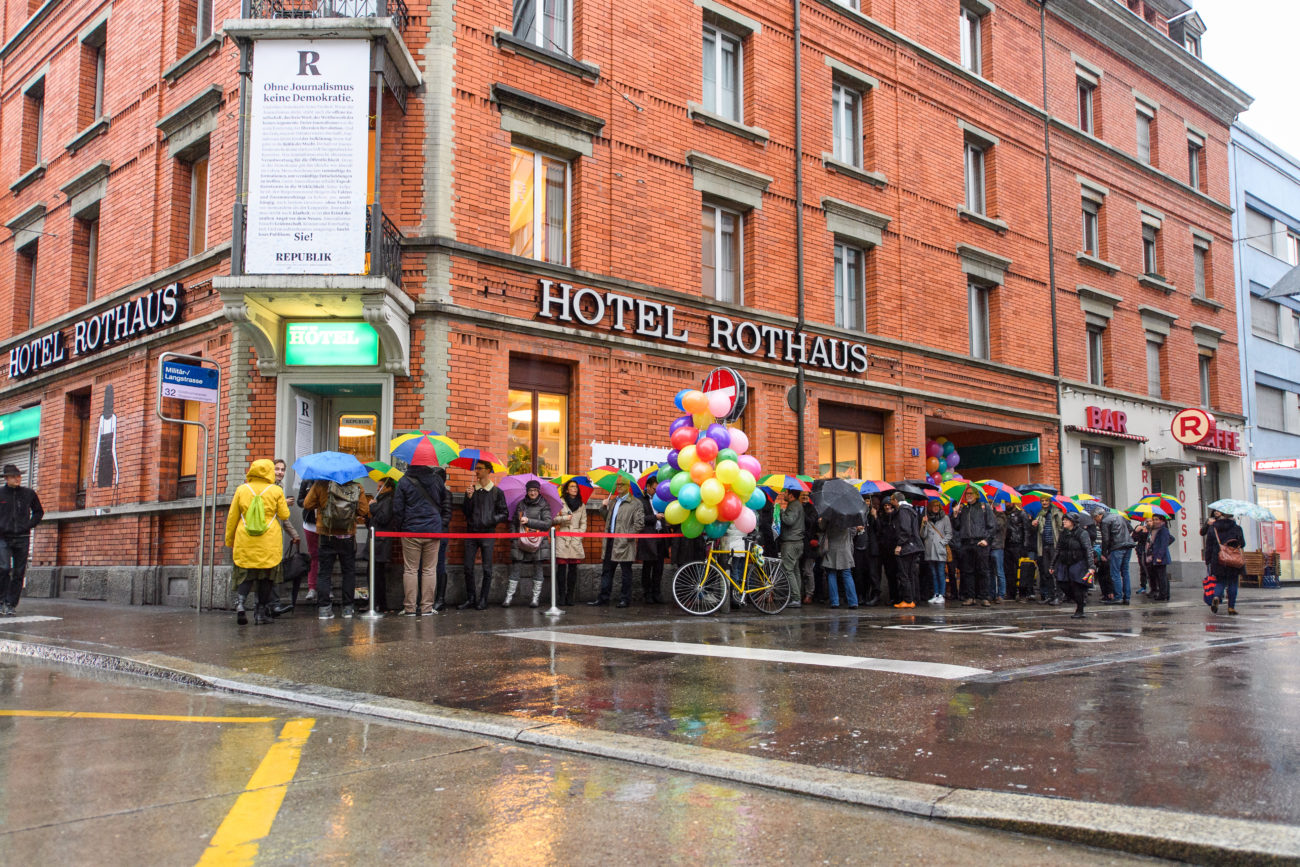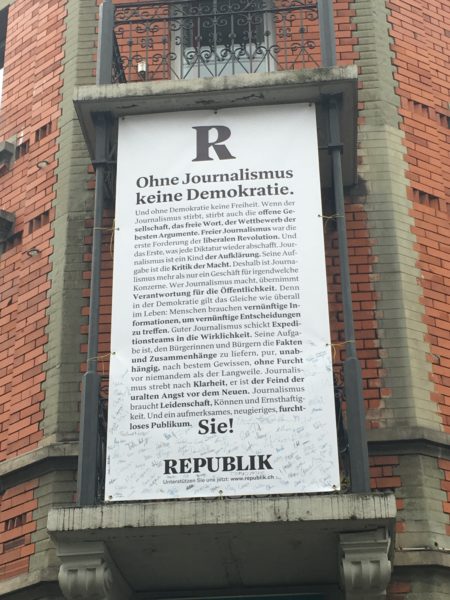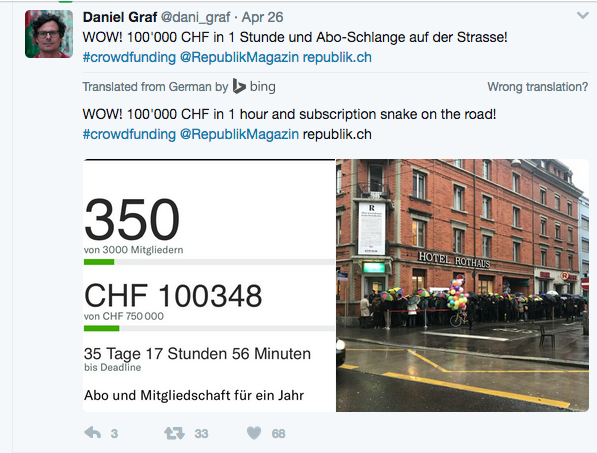Sign up for the daily CJR newsletter.
Last Wednesday, shortly before 7 am, Constantin Seibt took a few deep breaths to steady himself before walking the last block to Zurich’s Hotel Rothaus, a former brothel-turned-hotel-turned-temporary office for a journalism startup called Republik.
It was the first day of a crowdfunding effort to prove to investors there was market support for an online magazine financed by subscriptions.
The concept, as Seibt describes it, is simple: “No-bullshit journalism.”
The magazine, which will publish in German, promises to upload three pieces of journalism a day—articles, podcasts, photo reportage, or video—that will be well researched, well sourced, and factual. That material will sit behind a strong paywall, because content has value.
The goal was to generate 750,000 Swiss francs (about $750,000) in 35 days by convincing 3,000 people to pay 240 francs each for a one-year subscription to an online magazine that has yet to publish its first story.
Seibt and nine other co-conspirators calling themselves Project R had invited friends to hang out in the hotel coffee shop to mark the first day of the crowdfunding campaign. They even put out a call on social media for others to join them: Sign up to Republik online or come on down to Zurich’s trendy, gentrifying fourth district to donate.
By mid-morning, the coffee machine was on overdrive: A line had formed around the block, club-style. Swiss radio and other media began to take notice.
“We didn’t see it coming,” Seibt, 51, tells CJR.
By 3 pm they had met their initial goal, so they set a new target. Within two days, they had raised $2 million, beating a previous crowd-funding effort by Dutch news portal De Correspondent.
Now, a week into the effort, Republik has more than 10,400 subscribers and more than 2.6 million francs in crowdfunding, in addition to 3.5 million francs in startup cash they raised from investors, including the Meili brothers, a doctor, psychiatrist, and architect living in Zurich whose father made his fortune developing the technology used in modern fire alarms. Other local investors aren’t currently being named for legal reasons, business manager Susanne Sugimoto says, but the group hopes to identify them soon.
Sugimoto reckons the company will break even with 22,000 subscribers, a goal she had initially calculated would take five years. She won’t dare to predict if they’ll get that far this year for fear of jinxing them.
The fundraising success proves that Republik has hit a nerve. “No one was expecting this success,” says Anja Draeger, a board member of the Swiss Union of Broadcast Journalists. But, she adds, “The need was clear.”
Media in Switzerland is increasingly concentrated in the hands of a few corporations, threatening the diversity and plurality of news in a country with a population of 8 million divided by four national languages and straddling the larger media markets of Germany, France, and Italy.
Millionaire businessman Christoph Blocher, who for decades has been the leading ideologist behind the far right Swiss People’s Party here, purchased a one-third share of the largest subscription newspaper in Basel three years ago. According to various reports, the Blochers aim to expand their media empire at a time when the Swiss People’s Party is sponsoring a national referendum to make funding from every Swiss household for the country’s public broadcaster, SRF, voluntary instead of mandatory.
At the same time, as in other countries, newsrooms are laying off journalists. Online outlets focus increasingly on brain candy—soft news or emotionally laden stories that intentionally provoke outrage—and legacy media organizations feel they must compete.
Republik co-founder Christof Moser, a journalist and professor, is the brains behind the project. He sneers incredulously at Switzerland’s largest print outlet, 20 Minuten, a free commuter paper, noting that nearly all their stories rely on only one source. “That’s not journalism,” he says. “That is systematically anti-journalism. You use one source, you have no ethical standards.”
“Project R’s initial success shows that many people are seriously worried about the loss of quality journalism,” Philipp Bachmann, a professor at University of Zurich’s Institute of Mass Communication and Media Research, wrote in an email.
Now, Moser and Seibt say, the pressure is on to produce a stunningly great product. They clearly feel the heat. During our conversation in the hotel coffee shop, their faces were strained and their hair unkempt. Both chain smoked nervously. Five days into the most successful fundraising effort in Swiss history, the group hasn’t paused to celebrate. “There’s no time,” Moser said.
Seibt agreed: “We can’t fuck it up.”
As one of the highest profile journalists in the German-speaking part of the country, Seibt may have the most to lose. Born in Frankfurt, he worked for years at a Swiss weekly, first as a journalist then as its editor. He switched to Zurich’s Tages-Anzeiger 10 years ago, where he won a top journalism prize in 2008 and wrote a book, Deadline, for budding reporters.
When Moser approached him nearly three years ago with the idea of starting an ambitious magazine, Seibt was already frustrated with life in the newsroom, with its endless rounds of cuts and increased pressure to produce stories fast with less emphasis on thoroughness.
“My heart needed one more year to accept what my head knew,” he says. Seibt’s decision to quit his day job at Tages-Anzeiger last October to work full-time on Project R made headlines on media sites. “If we don’t [create something great], we will be laughed out of the country,” he tells CJR.
Two role models for the project early on, Moser says, were Ida Tarbell, the American muckraker, and Thomas Jefferson, for his unrelenting support of free speech.
Project R’s vision is to take their time and produce thoughtful, honest pieces. They plan to use some of their new funding on four “monster investigations,” each of which could now potentially have budgets of up to 60,000 francs. “No other Swiss medium that we know of will invest so much time and money into journalism investigations,” Seibt says.
Their goal isn’t to be fast, but to be thorough. It’s not to be the biggest, but to be the highest quality. “Buy us because we’ll give you less,” he laughs.
Moser jumps in: “Less noise.”
In short, Seibt says, “We have to hack the system.”
In this golden age of storytelling, too few reporters have the luxury of time, money and resources to use all the tools available, like data, interactive graphics, or video—or all three.
“We want to target the heart of the reader,” Seibt says.
To do that right, they say, journalists need to be free from commercial pressure. And if readers value quality journalism, they should pay for it. That’s why Project R opted for a high annual subscription fee and a strict paywall.
The company is structured so that paid subscribers are automatically members of the Project R Cooperative, which will own no more than 49 percent of Republik, a for-profit publication. The investors will control about 20 percent, while the rest of the shareholders will be founders and staff. The idea is that while each group—readers, investors, and staff—has some say over the company’s direction, none has sole control.
The 10 founding members of Project R include five men and five women of different ages and a variety of backgrounds. In addition to the two journalists, there are software engineers and specialists in IT, finance, marketing, crowdfunding, and business.
All will earn the same, enviable paycheck of 8,000 francs per month (Swiss companies pay employees 13 months of salaries per year). They promise to be equally generous with freelancers. One of their fundraising goals is money for translations so they can accept stories from non-German speakers.
The group isn’t just upfront about pay; it aims to be equally transparent in its reporting, Moser promises. And Clara Vuillemin, 25, who heads up IT, says her team has created an open source platform for Republik that will be available for other journalism startups to use.
With trademark Swiss attention to detail, the group has even created its own typeface. The Republik font is messy by design: “It’s not clean, not finished,” says Nadja Schnetzler, president of Republik. “It’s something that will irritate you, like we hope our articles might from time to time.”
They also are taking their time to create the perfect product before they launch. Moser and Seibt say the venture isn’t likely to start before the beginning of 2018. In the meantime, they plan to hire 11 newsroom staff and begin to develop stories.
Taking time has been a hallmark. For the last 18 months, Project R invited 75 journalists and communication specialists from the German-speaking part of the country to monthly meetings to act as a sounding board.
That group also helped build contacts and generate buzz. By the time the crowdfunding started last week, they had collected 8,000 names for their newsletter. Still, as Sugimoto points out, it’s one thing to add your name to a list; it’s something entirely different to shell out 240 francs. Particularly satisfying for the group is that the average donor contributes 251 francs. Fewer than 50 people have opted to pay less than the recommended donation.
A key goal for Republik is to attract readers who understand and value longform journalism so that they stay hooked for the long term. Schnetzler notes that about 40 percent of the De Correspondent’s initial donors did not re-subscribe for a second year. (The site has since rebounded.)
Project R is trying to minimize that dip by using the crowdfunding as a teachable moment, explaining to potential readers why journalism is crucial for democracy. Moser thought Republik would be a good name because it comes from Res Publica, Latin for “public affairs,” and a synonym for “commonwealth.”
Seibt noted that each Project R office has its own toilet and shower because they are former hotel rooms, something he views as a reminder of their mission. “This is a guarantee for clean journalism,” he says.
Part of the group’s manifesto, which hangs from a balcony outside Hotel Rothaus, reads:
Journalism is more than just a business to be run by corporate executives. Journalism is responsible only to the public—for democracy is the same as life: it’s about making sound decisions and depends on getting sound information. Good journalism sends out teams to explore reality. The mission of journalists is to bring back the facts and context that citizens in a democracy need—and to report them as they are, independently, conscientiously, and fearing no one but boredom.
Has America ever needed a media defender more than now? Help us by joining CJR today.









